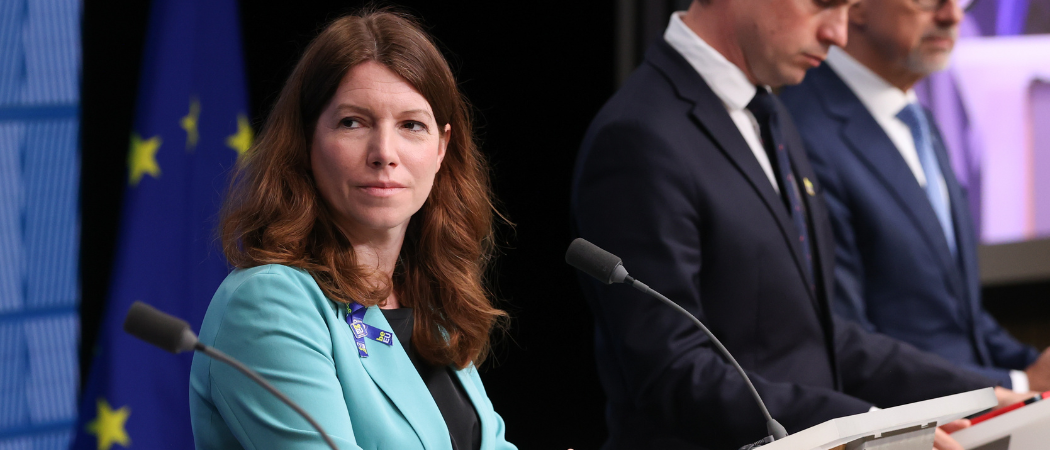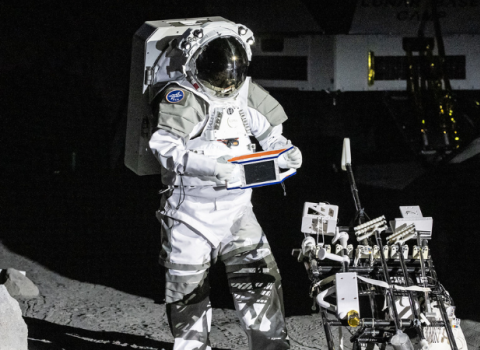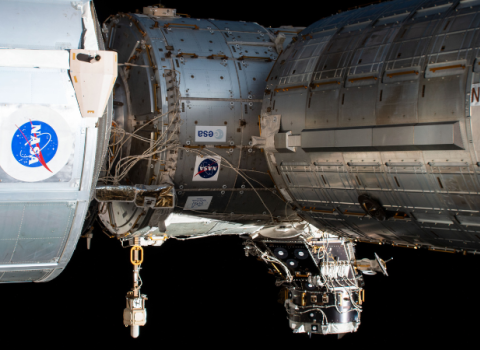At an EU Council meeting, space ministers highlighted the important role the sector can play in the competitiveness of European industry

Anna Christmann, the German ESA ministerial council chair, and federal aerospace coordinator, attending the Competitiveness Council on May 23, 2024. Photo credits: European Union
EU ministers called for increased public and private investment to support innovation in the space sector today, as they pledged to use space to boost European competitiveness.
Their joint resolution, issued at a ministerial meeting 23 May, highlights the potential of space services to help various industries gain a technological edge, to support climate protection, and to safeguard critical infrastructure such as energy systems.
The ministers hope to create an “attractive environment” to increase private investment, particularly in start-ups and SMEs, said Anna Christmann, Germany’s federal aerospace coordinator and ESA ministerial council chair. “Private investments are key. That’s what we see as a worldwide development, and so it’s important that we also see this development more and more in Europe.”
The European Space Agency (ESA) has taken steps in recent months to adapt its procurement model to act as an anchor customer, providing industry with contracts, rather than owning rockets and space vehicles. It hopes this will support the development of new players in the sector.
In their statement, the EU ministers welcomed this new approach, as well as initiatives such as the EU’s €1 billion CASSINI programme to support entrepreneurs, start-ups and SMEs in the space industry.
“Small and medium-sized enterprises as well as startups contribute more and more to Europe’s innovative potential and competitiveness. We have to continue to specifically encourage and promote this diversification,” said Christmann at a news briefing after the council meeting.
Industry wants more
Trade association Eurospace welcomed the support, but urged political leaders to do more to address the challenges facing the sector, including the fragmentation of supply and demand and the industry’s declining profitability.
“The current pace of global transformation demands more than disjointed supranational, intergovernmental, and national industrial strategies,” Eurospace said in a statement, calling for a Europe-wide industrial strategy for space.
The ministers were meeting in two groupings: first as a regular Competitiveness Council to discuss EU policy, and then as a joint Space Council between EU space ministers and non-EU ministers that are part of ESA – namely Canada, Switzerland, Norway and the United Kingdom – who also agreed to the resolution.
It was the eleventh official meeting in the 20 years since the ESA and EU signed a cooperation agreement, and the first in four years. ESA Director General Josef Aschbacher said collaboration with the EU is key to competing with global superpowers, since NASA invests approximately three times more in space activities than ESA.
Timo Pesonen, director general for defence industry and space at the European Commission, said there needs to be a “much bigger” space programme in the EU’s next long-term budget from 2028. “The last one was agreed during the previous geopolitical situation, before the Russian invasion of Ukraine,” he noted.
“We are still dependent on non-EU supply chains, including a temporary lack of autonomous access to space. We have a limited capacity to rapidly upscale production when needed, and limited access to global space markets,” Pesonen said.
Europe is currently undergoing a launcher crisis, after the loss of access to Russia’s Soyuz rockets following the Ukraine invasion, and delays to the Ariane 6 and Vega-C rockets. An end is potentially in sight with Ariane 6’s inaugural launch currently planned for July.
New space law to come
EU ministers also discussed the Commission’s upcoming proposal for an EU Space Law, which aims to build a European single market for space. Eleven member states already have national space laws, and more are in development, creating a risk of fragmentation which the Commission wants to address by setting common rules around safety, resilience and sustainability.
The law was one of Commission President Ursula von der Leyen’s priorities for 2024, but there is currently no indication as to when it will be put forward. Pesonen did not rule out the possibility of it being published after the EU elections, but before a new Commission is named.
The text is expected to focus on tackling the risks of collision and space debris, protecting space infrastructure, and setting common rules for calculating the environmental impact of space activities.
Thomas Dermine, the minister in charge of science policy for Belgium, which currently holds the rotating EU Council presidency, said there was “clearly momentum to reduce the heterogeneity of legal frameworks in the EU”. He said an EU Space Law should be “proportionate” and allow all types of actors to be competitive, “from start-ups to established players”.
Competition winners announced
On Wednesday, ahead of the Council meeting, ESA announced that two European companies had been selected to develop services to deliver cargo to and from low Earth orbit.
Germany’s Exploration Company and Italy-based Thales Alenia Space have won contracts to deliver supplies to the International Space Station by 2028, with a view to also serving other destinations and potentially sending crew into space.
ESA member states agreed to launch the competition at the Space Summit in Seville in November 2023. The contracts have been signed for the first phase of development, which had an overall ESA budget of €75 million. The budget for the second phase up to demonstration stage is expected to be much larger, and will be decided at the ministerial summit next year.
The initiative represents a major step towards the competition model, which was pioneered by NASA and helped to develop companies including SpaceX. ESA also plans to launch a competition to provide a launch service, with no weight class limitation.
November’s summit also saw ESA announce the Zero Debris Charter, a voluntary commitment to work to stop creating new space debris by 2030. The agency announced this week that twelve nations had signed the charter: Austria, Belgium, Cyprus, Estonia, Germany, Lithuania, Poland, Portugal, Romania, Slovakia, Sweden and the UK. More than 100 organisations have likewise promised to adhere to the commitments.





 A unique international forum for public research organisations and companies to connect their external engagement with strategic interests around their R&D system.
A unique international forum for public research organisations and companies to connect their external engagement with strategic interests around their R&D system.